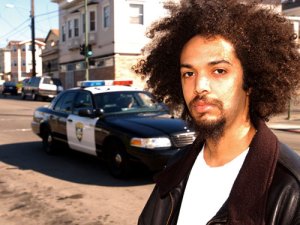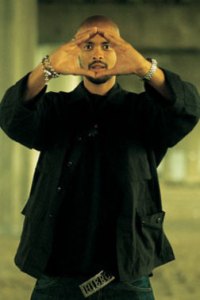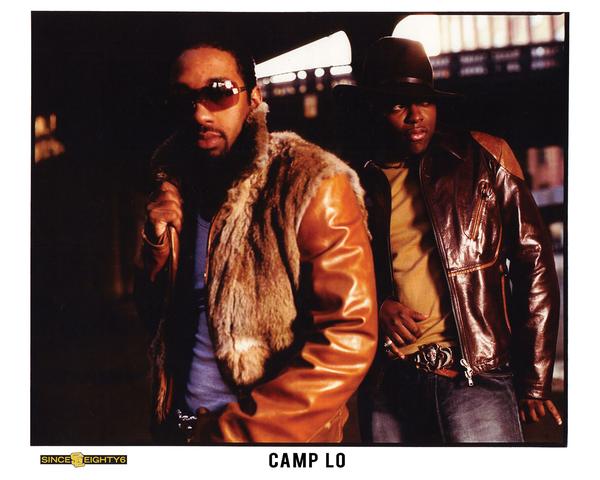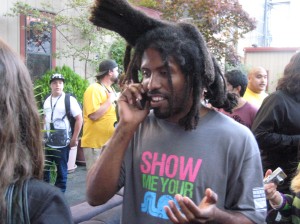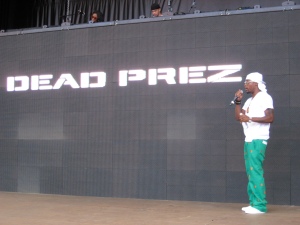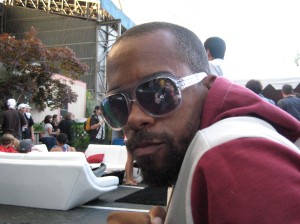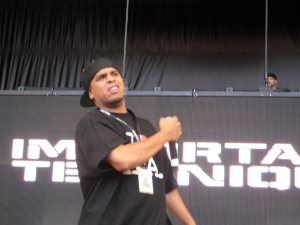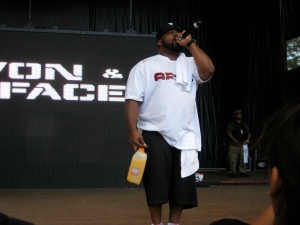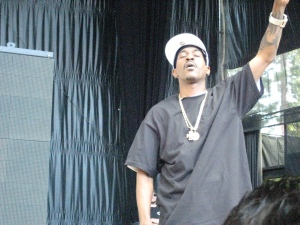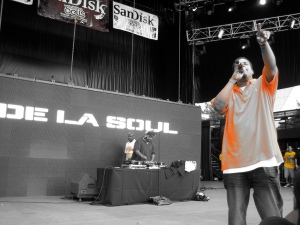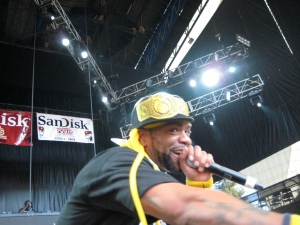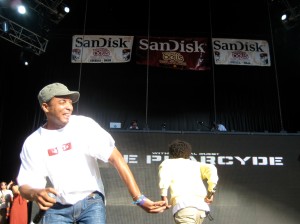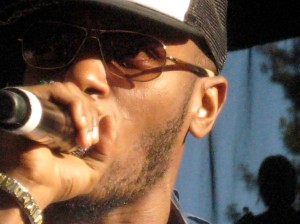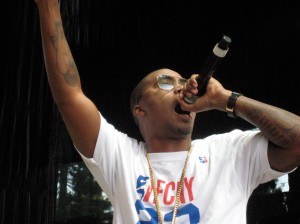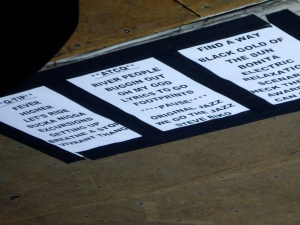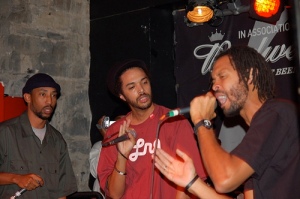
Opio and Tajai (right) of Souls of Mischief/Hieroglyphics
For Part 1 of this interview, click here. In Part 2 of my interview with Opio and Tajai, we discussed Bay Area Hip-hop, fan remixes, greatest albums of all time and the life lessons taught by their genre.
ACtual: I think that the Bay Area has some of the best Hip-Hop. There’s always people coming out from the Bay, the Hiero crew, E-40, Nickatina, Zion-I, lot of good groups. What do you think it is about this area that you think produces such good Hip-Hop?
Tajai: We’ve got diverse backgrounds, the port, especially Oakland and San Francisco, we’re the coast. If you look at the array of blue vs. red states, you’ll see that the coasts, where they have more than one type of person, or more than two types of people are places that embrace new and fresh ideas. Beyond that, there’s nothing to do out here. This is the worst place to try to start your career once you’ve made your move, so people are just bored so they make stuff. I could see in LA or New York, you can dress like a rapper, and look like one and hit the clubs and get that whole like, “I’m in the scene” thing. There’s no scene here, so you have to really be who you say you with regards to music. You have to do things yourself to achieve it rather than just looking the part. In other places you could look the part and try to get over like, “you know me…” and try to get in the clubs free, there aren’t any clubs out here. Because the scene is so wack, people are more creative and because we have a diverse background. This isn’t just the place where hella dope Hip-Hop is from. This is the place where the Panthers are from, where the hippies are from, where you look at San Francisco and gay rights, we’re on some other shit out here, we’re on some next level shit.
Opio: We’re trying to have equality out here. So in other places, in order to distinguish yourself and make yourself be something special to make people respect you like, “You’re doing something good, cool!” We ain’t really about that out here. It’s more about everyone is on the same level, so when in the Bay Area people lift you up and say, “Your shit is dope” that’s saying something because they have to see you and hear you and see it for themselves and know it’s true. Cause if not, you’re not going to get it. You might get it if you’re coming from somewhere else because it takes a lot to get on the scene and get heard. But if you come up from the grass roots out here, people are always like, “You’re never gonna do it.” Not that people are negative in general, but we ain’t really starstruck out here. You don’t see a lot of Bentleys and Lamborghinis and all that, and I don’t think it’s cause people can’t have it.
T: There’s a lot of money here. Per capita we’re probably one of the more wealthy cities in America.
O: That’s just not our stilo out here. You’re gonna stand out and make people get mad at you like, “What are you doing all that for? What do you need a Bentley and Lamborghini and all that for?” There’s something wrong with that out here, almost inherently so. People like to see you shine but they want you to be humble, you have to be a real person out here in order to maintain. So I feel blessed that we’re able to get respected out here, in this city in particular, especially being from here in all the years that we’ve been here, it’s a good feeling when we go to the Art and Soul festival or something like that. It’s a community gathering and there’s people from everywhere, but we still get love just like people paid to come see us at a show.
AC: A lot of groups are letting fans remix their work, putting stems up on the internet, doing remix work. Can you see getting into that and letting your fans work with your music like that?
T: We’ve got a whole album of fan remixes out. It’s called Over Time. So we’ve been doing that. So we might do it on this next record where we might put our ProTools files up and let people who are really serious about pushing the envelope and taking our music to the next level, do it. Because why not? We put our take on it, let them put their take on it. It’s not going to make less of what we have done. Once you’ve created something, like a record, it stands the test of time. All of our singles, we put up a capella so people can remix it, that’s the whole point. We sell a capella, we put it up on the internet so people can remix it.
O: We let people remix a single from my album Stop the Press, put that out there. We like that sort of stuff. The whole inspiration for us being independent was the show aspect, the whole interactive style, even if it’s over the internet or whatever. We want to maintain that where people can interact with our music and do whatever they want to do with it, manipulate it, that’s cool to me. Because I think eventually something really dope could come out of that. I’ve heard some shit that’s pretty tight, but I mean like if someone is out there just looking for an opportunity to do something with it and they just need the right sound or whatever and we could be a part of that, that would be dope.
AC: What are the current projects you guys are working on?
T: We’ve got Vulture’s Wisdom Vol. 2, probably going to start off the next year. We’ve got a new album by Souls of Mischief, we haven’t figured out the title but it’s done, produced by Prince Paul. New Casual album, Pep Love’s album called The Reconstruction, Del’s coming out with the LED EP, I’ve got an EP called THC 7. Opio came up with this idea, we’re gonna smash fools. Every week in 2009 we’re going to come out with a new song. Not a new freestyle, not a new rap over somebody else’s beat, a new song every week. So we’ll have 52 new Hiero songs plus about 5 or 6 new albums in 2009.
AC: Are you going to put all of those on iTunes?
T: Yea, they’ll all be out digital.
AC: A song every week?
T: We’ve got so much music, why not put it out? There’s no point in hoarding it because what good is music doing in the vault? Music is made to play, it’s not like money.
O: One thing is that it’s for our fans. For the people that supported us, they’re always looking for us, like, “What’s up with you guys? You guys ain’t coming out with this that and the other,” and they always want to hear something new. We have music done, but we’ll think we have to save it or whatever. But at this point in time, the way things are, people just want to hear it, they can’t stand it anymore, we just feel like now’s the time to let people get an inside look at whatever we’re doing, right then and there. We’ve never been the type of cats to just record a song and slap it on the internet or put it out. Everything we ever did came out 2-3 years after it was done, literally, I’m not even joking. Anything you ever heard was a long time ago by the time it came out. So as artists it’s something we’ve always struggled with because we’re always like, “We got some shit that’s hot, we want it out right now,” and we just never really had that vehicle. I kinda feel like now’s the time. The internet is such a community where people come together. I go there myself to listen to new music, do my YouTube thing, peep out all the underground shit that you can’t hear on the radio or you don’t see on television or whatever. There’s a large community of people out there where if we could let people that love Hieroglyphics know that you come to this one place and listen to all of our music, it’s hear for you, I think it would do a lot to re-energize our fans that have been supporting us. We got it for them.
T: We’ve got fans that are so loyal that they’ve stuck with us for the past 15, really 17, 18 years. Del’s first record came out in ’91, so some people have literally been waiting a lifetime for a lot of this shit and it never comes out. Most records when they come out, they’re finished two years or a year before they hit the mainstream, and we’re independent, we can’t do that.
O: We want to give people that, like we said, try and keep it interactive. We want people to have the experience and share it with us, like, “This is a hot song, listen!” I love that, I’m excited as an artist. I mean, we’re all owners of the label and we always have to make smart business decisions in terms of how we release our music because that’s our thing, we gotta make sure it’s right, everything’s gotta be cool. That’s still the Hieroglyphics thing, we always want quality product, that’s why we ain’t just throwing a bunch of shit out there. This is real music that we’re giving to people. For me, I want to thank the people out there that have basically been sticking with us for all these years. I can really say, with all honesty that they’ve been waiting on certain things that they just haven’t been able to get. The music is there, they just aren’t able to be exposed to it, so we’re kinda changing our philosophy about that a little. We want to expose people to our music and give them an opportunity to come in. There’s so much of it that it’s almost a crime to not let people just hear it.
AC: What are you guys looking at in terms of target release dates for the Hiero album and the Souls album?
T: Souls, at the earliest April, the Hiero by the end of the year. Because downloading has basically destroyed the concept of the album, everything on your album can be a single now, there’s no album cut. So let’s drop a song every week so people can buy that single and pick up a Hiero song if they want a Hiero song, an Opio or Tajai song, Souls song whatever. The records will then come out for people who liked what they heard in the single format.
O: We always have albums available for people at our shows, and those albums obviously have bonus materials that you’re only able to get when you buy that specific thing. Just the way that it is right now, I don’t know if people really sit down and listen to an album in the same manner, actually I know they don’t. I’m just different in my philosophy of how I listen to records, and I look for certain things, but that’s not how it’s going forward at this particular moment. People ain’t necessarily throwing on a CD, sitting down and listening to the whole thing. They’re skipping through a bunch of songs, whatever whatever, oh that was kinda cool, and that’s about it. So this way you can sit back and enjoy these songs for a week or whatever, then get a new one.
AC: Favorite conversation in Hip-Hop: Greatest album of all time. Where do you two stand? A couple that stand out?
O: It Takes a Nation of Millions comes to mind, right off the top. AmeriKKKa’s Most Wanted, Ice Cube.
T: And even that is great because of It Takes a Nation…
O: Low End Theory is almost perfection, The Chronic, 3 Feet High and Rising. 3 Feet High and Rising is different because there’s so much material on there, it’s like a carnival, I love that album, that album is crazy. Then there’s other albums for us, Funky Technician, Stunts, Blunts and Hip-Hop.
T: The Main Source first record.
O: CMW, Music to Driveby.
T: I’d say Nation of Millions.
O: There’s so many albums but the gold standard of all of that I would have to say is It Takes a Nation of Millions, cause that album –
T: Had everything.
O: Has all the elements, it was saying something as well. It was educating me on a lot of stuff as a young kid.
T: A lot of these records, that’s the one thing they’re probably missing is that educational content that damn near every album we mentioned did have, Main Source, The Funky Technician. I think a lot of rappers are OK just being rap.
O: It was about their mind power. All of those albums that we mentioned, it was all about what they brought to the table. They were mental giants. Now, that doesn’t even matter, you can be a straight mental molecule and as long as you have enough money and material –
T: Swagger.
O: It’s not even about swagger, because I give credit to swagger. Swagger everybody doesn’t have and everybody can’t get. Money is nothing, anyone can get that, it’s material things, you didn’t do anything by your own, there’s nothing that you created there. People will give a lot of credit, I’ve heard people say, “He’s wack, he sucks, but he’s got a lot of money and I respect that about that dude that he got his paper.” Who doesn’t want it? We all watch the TV shows, Lifestyles of the Rich and Famous, and we all want that, but to me, that’s not where Hip-Hop needs to be, Hip-Hop needs to be back to Takes a Nation of Millions level.
T: And it wasn’t like they were just un-positive. They were talking about all the shit that was hot in the streets, they had banging beats, they had scratches on their songs, it was connected in a way that you had to listen to from beginning to end, there aren’t any records like that any more. Fools don’t even take the time to craft albums anymore, they’re trying to craft songs.
AC: What has Hip-Hop taught you about life and what has life taught you to make you better at Hip-Hop?
O: The life experience of growing up here in the Bay Area, the diversity of thought that exists here, all the things we were exposed to, there’s so many levels that you have to understand and juggle at once. You have to be real perceptive out here to be good in your descriptions with words, but then you have to humble so when we went out, even though we had a lot of confidence in our skill and were ready to battle cats, we always paid respect and homage to all the cats who came before us. How Hip-Hop helped my life, artists like KRS-One, songs like “Why Is That?” that really helped me get a grasp on world history and these are large concepts that were coming from rap artists. Ways to live, knowledge of self, know your history, these kinds of things. There was a lot of misinformation that was going on and Hip-Hop was helping bring that to light. There is a lost past that doesn’t get talked about and this is something we need to be educated about, and that definitely influenced me in my life, through Hip-Hop, that was a vessel that helped me learn and get on the path to taking on those types of concepts. Also questioning the mainstream, like whatever I see on Fox News I’m not just going to take at face value and part of the reason I’m not going to do that and not be bamboozled or manipulated is because of Hip-Hop.
T: For me, Hip-Hop taught me about life that you have to complete what you started. Making songs, if you don’t think about it from beginning to end, it’s not going to be complete, so that’s probably the biggest lesson. That goes for business or whatever endeavor, you have to do it from beginning to end and if you don’t see it through to the end somebody else will. As far as what life taught me about Hip-Hop, it’s probably that it ain’t everything. I love Hip-Hop, it’s my favorite thing in the world, but it ain’t more important than my kid or taking a shit or something. You see what I’m saying? There are mundane things and other more important things that are more important than Hip-Hop, so you have to take it with a grain of salt. I love this, and I’ve given my life to this, but it’s not the only thing to live for.
